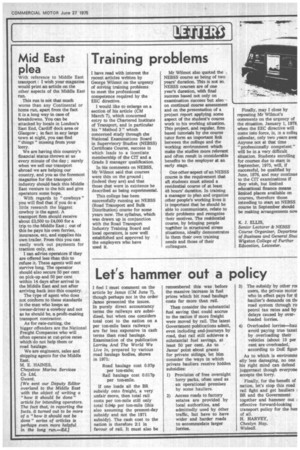Let's hammer out a policy
Page 47

If you've noticed an error in this article please click here to report it so we can fix it.
I feel I must comment on the article by Janus (CM June 7), though perhaps not in the order Janus presented the issues. In purely direct accountancy terms the railways are subsidised, but when one considers total cost to the nation on a per ton-mile basis railways are far less expensive in cash terms than road haulage. Examination of the publication Lorries And The World We Live In, prepared by various road haulage bodies, shows in 1971:
Road haulage cost 0.07p per ton-mile; Rail haulage cost 0.017p per ton-mile.
If one loads all the BR subsidy onto freight, a very unfair move, then total rail costs per ton-mile still only total 0.04p per ton-mile (this also assuming the present-day subsidy and not the 1971 subsidy). The cash cost to the nation is therefore 2:1 in favour of rail. It must also be remembered this was before the massive increase in fuel prices which hit road haulage costs far more than rail.
Then consider the substantial fuel saving that could accrue to the nation if more freight were moved by rail. The latest Government publications admit, even including end-journeys by road, that rail still achieves a silbstantial fuel savings, at least 50 per cent. As to Janus' point about grants for private sidings, let him consider the ways in which private hauliers receive hidden subsidies: 1) Provision of free overnight lorry parks, often used as an operational premises by some hauliers.
2) Access roads to factory estates are provided by local authorities, and admittedly used by other traffic, but have to have wider and harder roads to accommodate larger lorries.
3) The subsidy by other roi users, .the private motor who in effect pays for tt haulier's demands on th( road system through ro petrol tax rates and by delays caused by overloaded lorries.
4) Overloaded lorries—hau avoid paying true taxat by overloading their vehicles (about 10 per cent are overloaded, according to DoE figun As to which is environme ally 'less damaging, no one his right mind can defend juggernaut though everyone accepts the lorry.
Finally, for the 'benefit of nation, let's stop this road rail fight and get hauliers ; BR and the Government together and hammer out effective forward-looking transport policy for the ben of all.
H. HARVEY,
Ches/yn Hay,
Walsall.




















































































